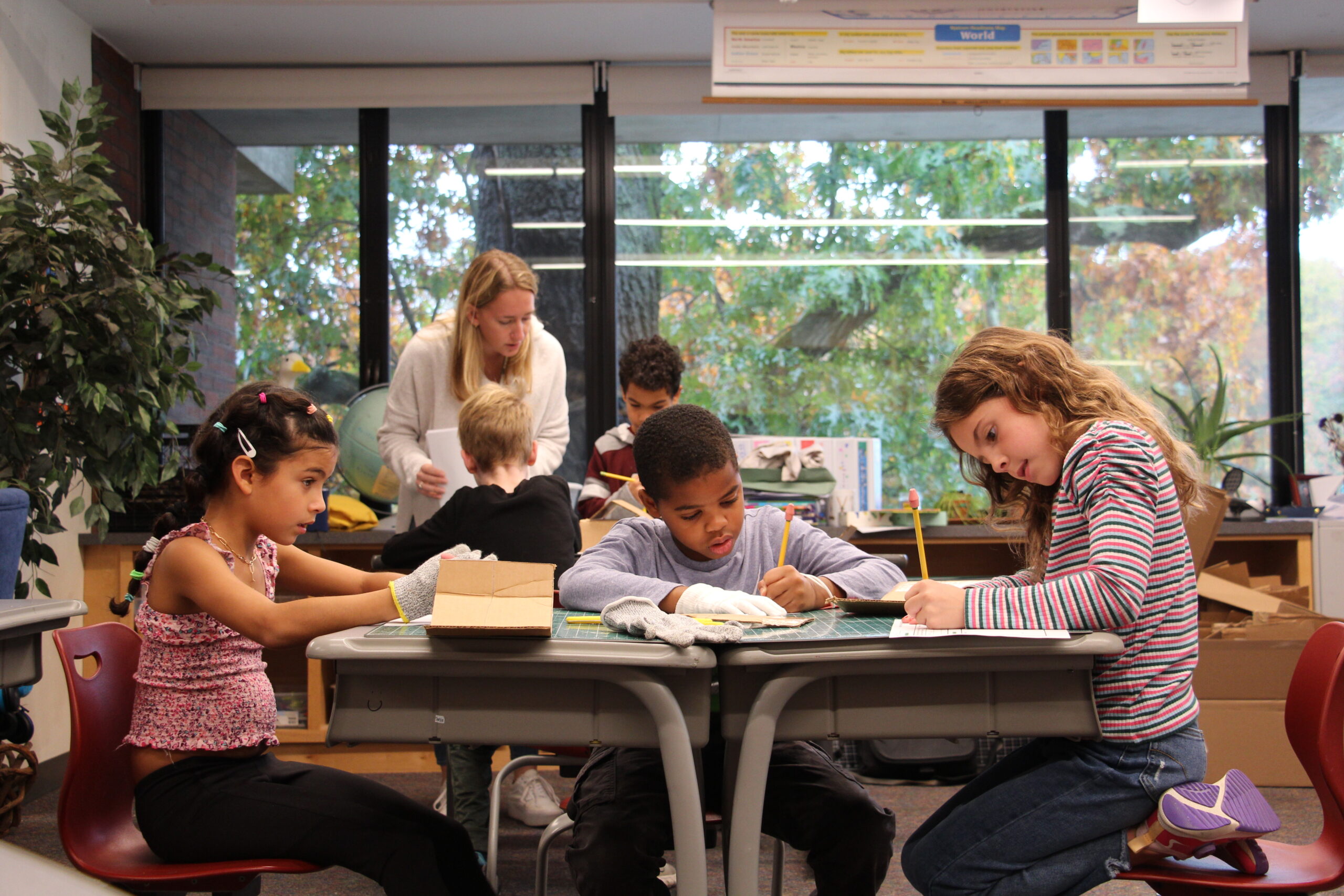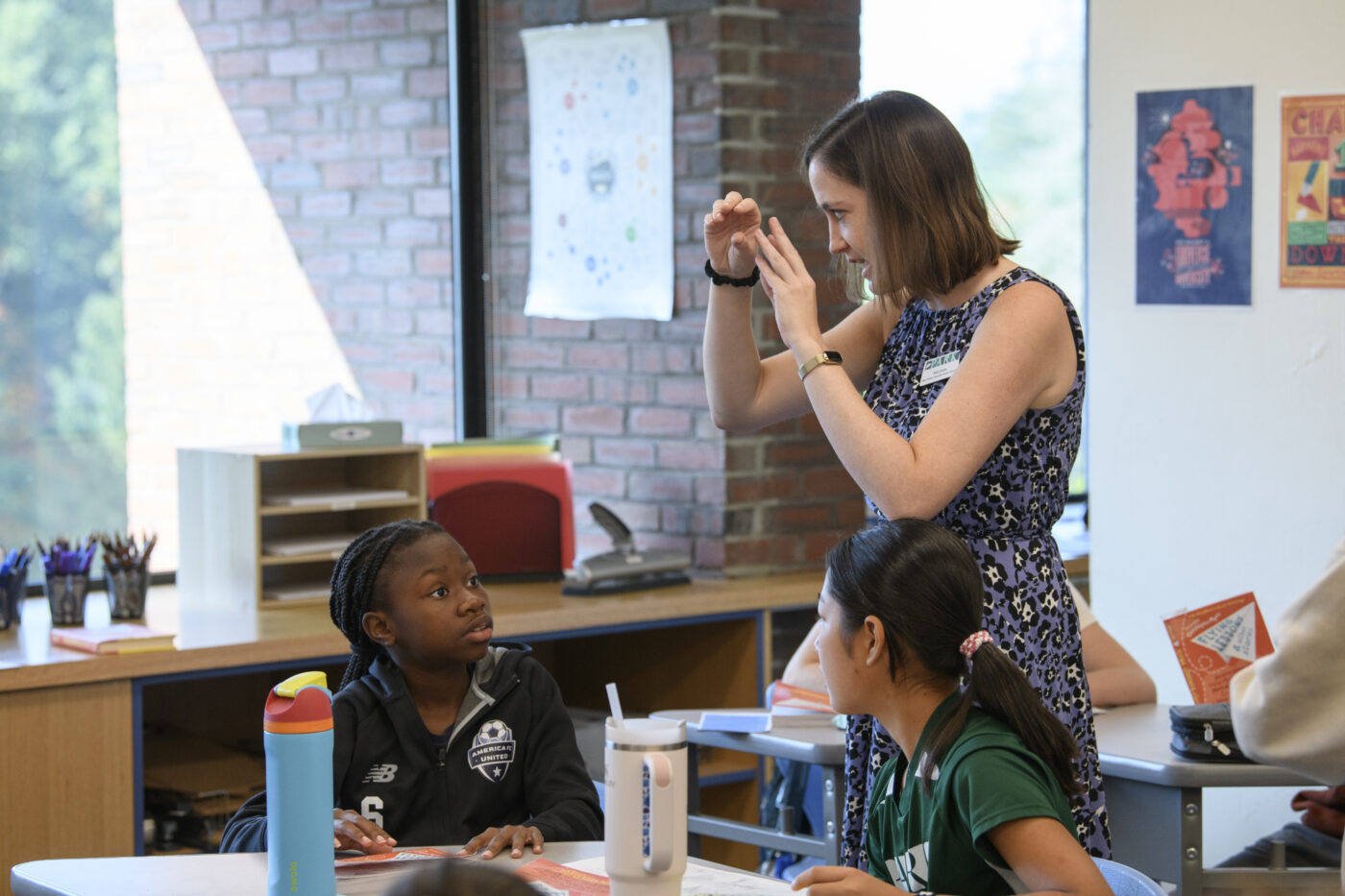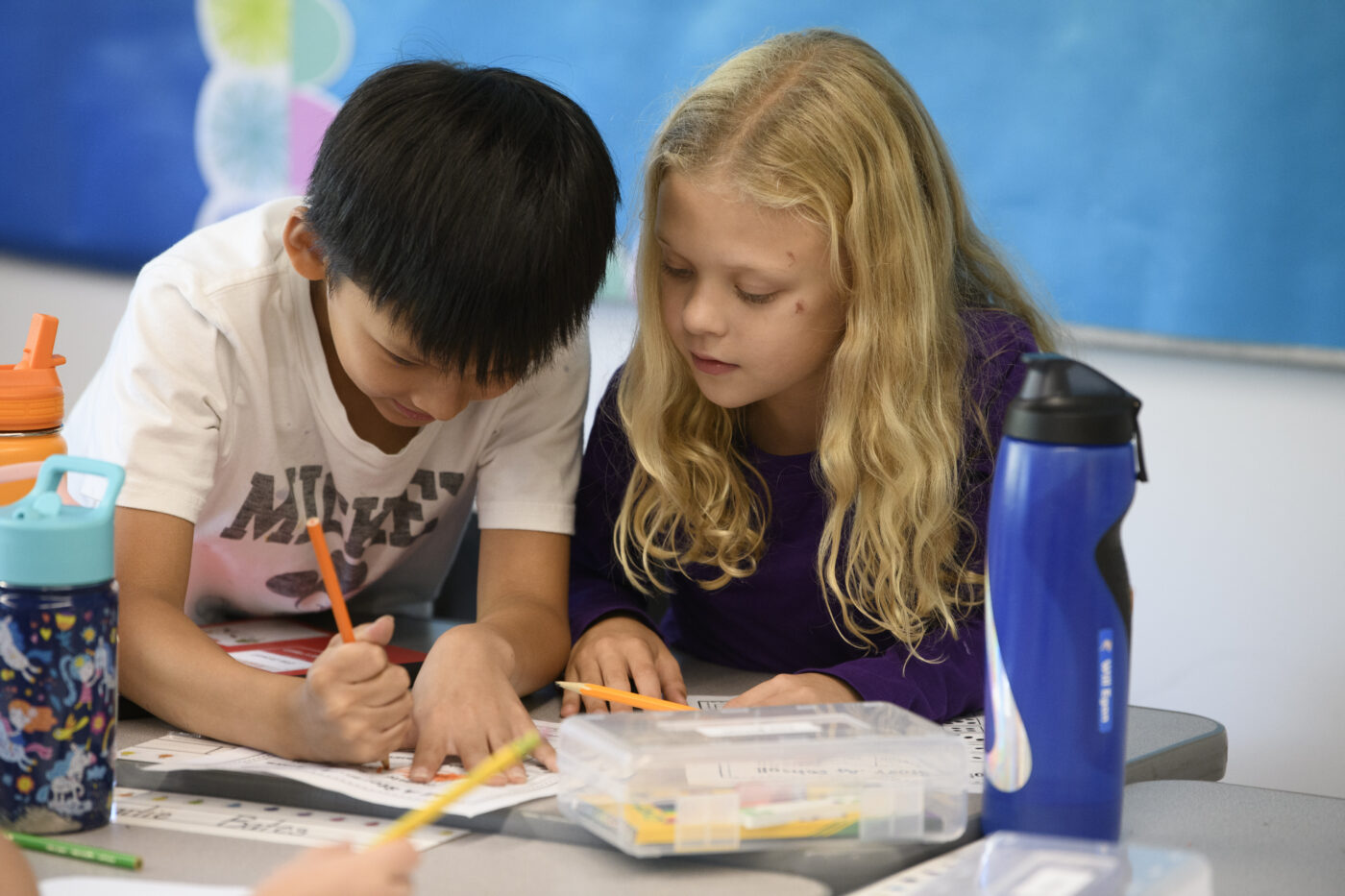
Within its mission of academic excellence, Park emphasizes the importance of helping every child meet their potential. That’s a lofty notion, and yet achieving this goal depends on the recognition that children learn in different ways, at different paces, and they may need to learn different strategies to access that potential. Getting that right is essential.
Often, it’s a watchful teacher, sometimes in partnership with parents and guardians, who notices that an individual student is hitting stumbling blocks in their classroom work. Other times it is through routine, annual diagnostic testing—a cornerstone of Park’s data-guided instructional approach—that particular areas of challenge surface. Interim Director of Academic Support Deb Dean says, “It is very difficult to fly under the radar at Park. Teachers are really in tune with student progress, well-being, and their academic capabilities.”
MEETING EACH STUDENT WHERE THEY ARE
Every Park classroom is designed to offer differentiated instruction, with small classes and opportunities for small group work and individualized attention. Park’s team of Academic Support Learning Specialists. are routinely and purposefully scheduled presences in the classroom, particularly in Upper Division, and they not only see individual students in the Academic Support offices, but have the ability to push into classrooms to support their own students, and others as well.
To support students growth in reading and writing in the Lower Division, Jeannine Bissonette, Literary Specialist for Grades 2–3, Alli Raabe, Literary Specialist for Grades PreK–1, and Kathy Hart, Coach for Literacy, Grade 4, partner with teachers, run mini-lessons in classrooms, and pull students out for small group work outside the classroom. Alli notes that, “Reading instruction at Park is based on the research that shows reading to be a highly complex process. All of our students benefit from explicit, systematic teaching of the various threads that come together for skilled reading to occur. Small group instruction, in a fun and supportive environment, allows for even more targeted teaching and learning to occur, simultaneously building students’ skills and confidence.”
In addition, in the Lower Division, Eliza Botsford, Math Specialist for Grades K–2, and Ellinor Wareham, Math Specialist for Grades 2–4, provide full-class lessons and small group pull-out to differentiate instruction for all learners. Ellinor notes, “The goal for every student at Park is to be a flexible, accurate, and efficient problem solver. Eliza and I provide low-floor, high-ceiling math tasks that engage all learners in the classroom. We also provide pull-out groups for students needing some differentiated work, both for remedial support and for enrichment.”

BUILDING LEARNING STRATEGIES
In both the Lower and Upper Divisions, Park’s Academic Support team provides an added layer of support, dropping into classrooms to work one-on-one with individual students or with small groups. If a student needs more individualized support to grow as a confident learner, members of Park’s Academic Support team are there to provide targeted, responsive, individualized, and student-centered help—whether it’s a challenge in managing organization and executive functioning, or the added practice in a given skill set needed to establish mastery.
Members of the Academic Support team work with students in Grades 1 through Grade 8, typically meeting two to three times a week based on identified academic needs. With younger students, the team pulls students out of class when the larger group is doing parallel work. Older students will most often meet with Academic Support during their TEACH, lunch, recess periods, or first thing in the morning. With this 1:1 student-to-teacher support, students are able to develop skills taught in the classroom. Deb Dean says, “Here, we can tailor the learning to their needs, and help them build skills and self-confidence for the classroom.”
The homeroom model in the Lower Division is ideal for supporting our younger students, with a lead teacher and grade level assistants managing the overall curriculum. This is supported by literacy and math specialists as well as Academic Support tutors who expand the ways in which a fully differentiated classroom can support the needs of all students. Park educators get to know students as individual learners, and by identifying where extra support in math or literacy may be needed—whether in small groups or individually. This helps ensure that by the time students reach the Upper Division, they have strategies in place that help them use their strengths to succeed.
Upper Division students similarly have layers of support, beginning with teachers who specialize in teaching a particular subject, as well as grade level teams, Grade Level Coordinators, and advisors, all of whom know the students well, oversee their progress and well-being and provide individualized support as needed. Lower Division Head Tina Fox identified the focus on a seamless transition between divisions, “We want to lay the foundations in the Lower Division so that when they get to the Upper Division, students can play to their strengths when they encounter challenges.”
The best outcomes happen when a student finds their voice, and their self-confidence is strong.”
— DEB DEAN, INTERIM DIRECTOR OF ACADEMIC SUPPORT
The goal, ultimately, is to support student growth so their reading levels, writing, and math skills are consistent with class and grade level expectations, and they can “graduate” from Academic Support. Former Park parent Rebecca Nordhaus reflects on her daughter Annabel’s Park journey, noting that “Park was very supportive of Annabel through her early academic journey. During lower school, Annabel was diagnosed with ADD. Many teachers showed great care and skill during this time. To name one—Jen Riley was Annabel’s tireless tutor and champion. She saw Annabel’s academic potential and understood the social/emotional challenges that often attend ADD. In no small part because of her dedication, and the resources and learning support at Park, Annabel is now thriving at Phillips Academy Andover. In the spirit of Park’s commitment to service, Annabel is also a committed advocate for neurodivergent learning styles and serves on Andover’s Advocates for Diverse Abilities board.”
WHEN FURTHER TESTING HELPS
On occasion, a student’s educational team—teachers, specialists, and members of Academic Support—may recommend that a family consider pursuing neuropsychological testing to gain greater insights into an individual child’s strengths and challenges. A neuropsychological evaluation is a process that opens the door to conversations with a child as well as their family about how their brain works, celebrating and acknowledging their strengths. The testing itself is a very interactive, student-centered process, taking place across multiple sessions, and it provides various tools that students and their families can draw on as students learn to understand their strengths in order to build structure around their areas of challenge.
The need for neuropsychological testing can emerge at different ages. A Lower Division student may, for example, excel at learning math facts but later struggle with concepts in Upper Division, or may find that decoding language comes naturally in the lower grades, while analysis and comprehension may become a challenge later on. In helping illuminate obstacles faced by individual students, this testing provides a means through which teachers, parents/guardians, and children can best understand how each child learns. Learning specialists can use the information to more closely target the learning styles of the students they support. Most important, however, the process provides an invaluable gift: each child, in understanding how their brain works, can understand their own superpowers–and this is extraordinarily empowering.
At Park, adults in the community periodically present at Morning Meeting, talking candidly about their own neurodiversity, sharing their own experience in learning to embrace their strengths. These opportunities are not only affirming for students as they negotiate similar growth—they offer everyone a window into appreciating yet another way that our diversity enhances our community.

PRIORITIZING EQUITY
While support from Park’s literacy and math specialists is part of the regular academic program, Park’s Academic Support program is a fee-based program open to all families whose children will benefit from this help. Consistent with Park’s commitment to making the full Park experience available to all students, regardless of a family’s ability to pay, families who qualify for financial aid receive the same level of support for any Academic Support time their children receive.
However, neuropsychological testing, which takes place outside of Park, is expensive, and out of reach for some families. That’s an obstacle Park has actively worked to address as part of The SPARK Campaign. “The fact that Park made funding for neuropsych testing one of the goals of SPARK really shows the school standing up for its values,” notes Scott Young. “If our mission is to ensure that EVERY student can reach their full potential, we need to make every resource available—including the diagnostic testing that supports the necessary scaffolding for their success.” The funds raised will facilitate neuropsychological testing each academic year for four to five
students for whom this opportunity would otherwise be financially out of reach.
OUR DIVERSE LEARNING COMMUNITY
Over the last five years, Park’s dedicated focus on this area has fundamentally changed the landscape of what it means to be a neurodivergent learner. Park is “proud of our teachers, who meet each student where they are,” Scott Young observes, “and proud of the students who embrace their own learning styles, building the strategies that enable them to overcome challenges. We are proud of the benefits made possible by having academic support tutors available to work with individual students both in their classrooms and privately, and we are very proud to be able to make neuropsych testing available to families who couldn’t otherwise afford it.” These efforts, deliberately structured within Park’s supportive, student- centered environment, help ensure every student can, indeed, reach their full potential.
When asked to define the ideal outcome these layers of intervention and support should provide, Deb Dean says, “The best outcomes happen when a student finds their voice, and their self-confidence is strong. They gain the skills to excel independently, with strong writing, math, and reading comprehension capabilities. We hope that our students go on to next schools readyto contribute actively to the community, and they are in the right place to thrive academically.
By Emma Hobart-Sheran and Suzy Akin

